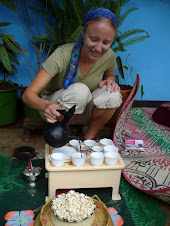I cooked my first authentic Ethiopian meal: shiro wot, a mixture of chickpea flour, water, oil, and spices. My version definitely had a farenji's touch, meaning that the flour was the main constituent instead of the oil, olive oil was substituted in place of solid palm oil, and the flavors of ginger and garlic tempered the predominance of berbere. I ate a healthy serving for lunch, then KB and I both ate it for dinner, but we were still left in the end with at least another generous helping. Having yet no means of overnight storage, I brought it to my landlady, thinking she might offer it to her two dogs. Instead, she took the pot from me and exclaimed, "You made shiro!" Now, I had been fairly nervous about bringing my concoction before a seasoned veteran of wot-cooking, and now that she had the pot in her hands, I was mortified. I became even more so when she dabbed a finger into the mixture and touched it to her tongue. After some moments of pensive lip-smacking, another finger dab, and a series of shifting and ambiguous facial expressions, she rendered her verdict: "K'onjo nouw." I laughed out loud; I didn't believe her. "Bewnet?" (Really?) "Bewnet. Bat'am k'onjo nouw." But she didn't stop at verbal affirmation. She would eat the remainder, she said. Now I was really laughing, and she along with me. I had just made my landlady dinner. The question was, was she really enjoying it, or was this all an elaborate program to protect my fragile farenji dignity? Either way, my immediate problem of food disposal was solved, so I was content. There would be time to confront self-esteem issues later.
But the shiro issue was not to be dropped so easily. About twenty minutes later, I heard the familiar, "Kristeeee…" and found my landlady standing in my kitchen, clean wot pot in hand. She wanted to know everything I had put into my shiro wot. I'd like to think she was asking for my recipe, but it is also distinctly possible that her inquiries were more along the lines of, "What on earth did I just eat?" In any case, she reaffirmed that it was "bat'am k'onjo," we laughed together a bit more, and she was out the door. But she was not done yet. I was in the bathroom when I heard KB laughingly call to me, "Christen, you're going to want to come out here." I walked out into the dining room area to see my landlady hovering over my makeshift pantry, examining each item that KB and I had bought earlier in the week. She tasted the shiro flour. She tasted the berbere. She scrutinized the liter bottle of olive oil for which I dropped 100 birr in Addis. She rattled my Tupperware container of dry lentils. She tasted the shiro flour again. She asked about everything: from where did we buy it, how much did we pay for it, in what quantity did we purchase it, in what form did it come to us? When her investigation was over, she told us that we would all go to the market together, we would buy everything we needed in its rawest (cheapest) form, and she would teach us how to prepare each individual ingredient for use.
I imagine that over the course of two years, I will be regularly willing to pay an extra seven birr (US $ 0.78) to have my chickpeas washed, dried, and ground for me. But now at the "honeymoon phase" of my Debremarkos experience, the thought of taking days to convert a bag of dry peas and a mound of hot red peppers into a pot of thick, spicy sludge (looking, quite frankly, like it's already a few steps down the digestive process, and a process taking place under some significant environmental stress, at that)…seems like good wholesome fun. Plus, I feel as if I've passed my first culinary test and have now been deemed worthy to be initiated into the next higher order of Ethiopian cooking.

No comments:
Post a Comment